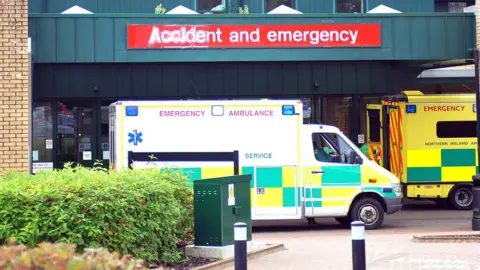Hospital pressures: NI health service 'still reeling from effect of pandemic'
 Pacemaker
PacemakerNorthern Ireland's health service "is still reeling from the pandemic", the health minister has said.
Robin Swann said health pressures are "only going to get worse despite the best efforts of staff".
It comes after Antrim Area hospital declared a potential major incident on Tuesday.
Mr Swann said the failure of Stormont to agree a three-year budget meant patients had been "cruelly robbed" of a chance to resolve the health crisis.
The collapse of the power-sharing executive - which means Stormont cannot strike a proposed budget for 2022-2025 - would have seen a 10% cash uplift for the Department of Health.
"The fact that we have limped from one single-year budget to the next for the last seven to eight years was just another reason our health service has been unable to keep up with demand," Mr Swan said.
Mr Swann pointed to the damage caused by the loss of additional funding that the draft budget would have provided.
He said he still hoped that some budget certainty can be "raised from those ashes".
He added that capacity cannot be rebuilt without the "certainty of funding" and without "training and recruiting the necessary numbers of staff".
Meanwhile, official figures from the Department of Health have shown a slight fall from the previous quarter in the numbers waiting for a first consultant-led outpatient appointment.
However, they also show that number has risen nearly 10% from the previous year.
In a report published on Tuesday outlining updated actions to tackle waiting lists, Mr Swann said significant progress had been made in some areas.
"This isn't going to be solved overnight; this is about a long-term solution to the crisis that we've seen brewing in the health service - not caused by Covid but exacerbated by Covid," he said.
On 31 December 2021, a total of 354,756 people were waiting to be seen - that's 1% fewer than at the end of the previous quarter, September 2021 (3,590).
However, that figure is almost 10% more on the previous December (31,582).
More than half those people, 52.6% (186,745) were waiting for more than 52 weeks for that first appointment - that figure remains largely unchanged from the previous quarter (52.5%) or in fact the previous year (51.9%).
The health minister's target is that no patient should wait longer than 52 weeks for a first consultant-led appointment.
 PACEMAKER
PACEMAKEROn Thursday, it emerged a patient had been discharged after being treated in a side room at the emergency department (ED) at Antrim Area Hospital for almost a week.
BBC News NI understands there were no available beds in a specialist ward.
The Northern Trust said "sadly these days it is not unusual for patients to be waiting a long time for beds to become available in wards".
The rare incident emerged after the hospital ran out of bed space, but was stood down that evening.
It is one step below a major incident, which means there are too many patients for staff to deal with safely.
'Covid complication'
The emergency department's manager, Bronagh Gilmore, told BBC News NI on Wednesday that some staff had been "traumatised" by the pressure.
She outlined there was "no physical space to stand, never mind to receive critically ill patients".
Dr Eimhear Kearney, a consultant in the department, added that the hospital had been operating at full capacity for months.
The Irish News first reported the case of a patient who, as of Wednesday, had been waiting for six days in Antrim's emergency department.
It is understood the woman received one-to-one treatment throughout her stay and has since been discharged.
In response, the trust said: "As we have stressed, the added complication of Covid means that we must do all that we can to keep those who are positive separate from other patients.
"Where possible, particularly long-wait patients will invariably be on hospital beds in side rooms in the emergency department and will be managed by the relevant specialist medical team and ED nurses until such times as a bed becomes available or they can be discharged when acute consultant-led care is no longer required."
Patients at other hospitals have faced similar waits in emergency department side rooms, some lasting for several days.
There are similar side rooms at both Altnagelvin Hospital in Londonderry and the Ulster Hospital in Dundonald which also have patients waiting to be admitted.
In recent days a number of health trusts in Northern Ireland have warned of increasing pressure from patient numbers, including calls for help in discharges to free up bed space.
'Pressures throughout system'
The medical director with the Northern Ireland Ambulance Service, Dr Nigel Ruddell, said crews were now often faced with long delays when transferring patients to hospital.
"This is not the fault of emergency departments, it reflects the pressures right throughout the hospital system," Dr Ruddell told BBC Radio Foyle.
"We normally expect ambulance crews to handover patients to hospital staff within about 15 minutes and clear shortly afterwards.
"Only one in 11 of our ambulances is able to do that at the minute, we are having ambulances waiting anything from one up to nearly nine hours to do that," he said.